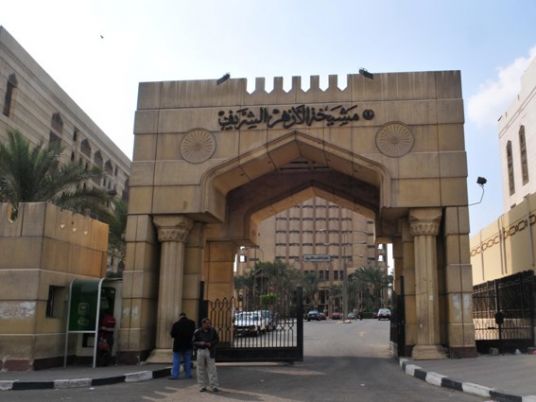
Tahrir Square on Friday was marred by a very poor turnout for yet another round of “saving the revolution” protests. The numbers in the square did not increase much beyond those who were already staging a sit-in after the expulsion of Salafi preacher Hazem Salah Abu Ismail from the presidential race.
The day, that was ostensibly about saving the revolution, was in fact one of calling for the implementation of Sharia law by the assembled Islamists.
This Friday, the protest was advocated by the Islamic Jihad movement, among others. Members Ahmed Abdallah and Sherif al-Sayed from Port Said had already been camping in the square for a week. Their one demand is the implementation of Sharia law in Egypt.
“We are not politicized,” said Abdallah, “We only have one demand and that is implementation of Sharia.”
They are also supporters of the recently disqualified Abu Ismail, and were convinced the upcoming presidential elections would be fraudulent because he was not in the race.
Abu Ismail was banned, said Sayed, “because he was the only candidate who stated he wanted to implement Sharia.”
“People think that applying Sharia means a step backwards, but it is not. Only the corrupt who have something to fear do no want it,” Abdallah said.
Chants from the Salafi stage in Tahrir reiterated: “The people want the implementation of Sharia law.”
The chants were shouted by the supporters in front of the stage, while the speaker onstage talked about the inevitability of the upcoming caliphate.
Although the Muslim Brotherhood was one of the main groups calling for the protest, as a continuation of last Friday's demanding for a swift power handover from the military and the exclusion of the previous regime's figures from political life, they were not visible this Friday.
But other groups besides the Islamists were in the square. One stage was hosted by a group that called itself the “revolutionaries without direction”, meaning they are not affiliated with any political ideology. Speakers on that stage spoke out against the Supreme Council of the Armed Forces (SCAF) and the People’s Assembly.
The different messages coming from the different stages confused some of those present, such as Kamal al-Zawawy, who was on his first ever visit to the square.
He was less than impressed.
“Everything is muddled up, it’s very difficult for a clear vision to come from this,” he said. “I can’t really form an opinion based on today.”
Zawawy said he was also a supporter of Abu Ismail even though he himself wasn’t a Salafi because of “Islamic reasons.” As Abu Ismail is out of the race, he had decided to support Muslim Brotherhood candidate Mohamed Morsy, because with the Brotherhood in charge of both Parliament and the presidency “something might get done.” He was also against military rule and wanted civilian rule with an Islamic bent.
Though the scene generally resembled the square on a normal weekday, one difference was the presence of the campaigners from a movement called “al-intikhabat fakh“ (elections are a trap). Carrying posters with the slogan, the campaigners – for a second week running – piqued the interests of those gathering in the square.
To explain the premise of the campaign, member Radwa Darwish said, “The elections seem to be a big soap opera, of which we are all extras rather than the stars. We are part of this theatre that propagates ‘the onset of democracy’.”
Article 28 of the Constitutional Declaration, which states that the decisions of the electoral commission cannot be challenged, serves as an example of this, Darwish said.
“How could we have a law like this, in a country that has always had a history of rigged elections?” she asked. “We know that could also be the case this time.”
The commission itself is not infallible, Darwish said, and its decisions should be challengable. As for the remaining 13 candidates, Darwish said the group takes no issue with them, but rather with the fact that they are running for a position with unknown powers.
“On what basis can they have an electoral platform, and how can we hold them accountable if we don’t even know their mandate,” she said. “Who is stronger, the president or SCAF?”
She wondered whether the future president will have the power to hold SCAF accountable for crimes committed against protesters, or be able to remove Field Marshal Hussein Tantawi.
Or, she asked,“will everything go the way of the lost rights of the martyrs?”
Away from the square, there was a protest held in front of the Foreign Ministry to protest the detainment of Egyptian lawyer Ahmed al-Gizawy in Saudi Arabia.
Gizawy had filed a lawsuit against Saudi King Abdallah for mistreatment of Egyptian prisoners in the Kingdom. While on trip to perform Umra, the lesser pilgrimage, he was arrested and accused of attempting to illegally smuggle large quantities of the drug Xanax into the kingdom.
Protesters said they had come to the foreign ministry to show their disapproval of the lackluster efforts the foreign service was exerting on his behalf.
Ahmed Saeed, coordinator of Asrana (our prisoners) which advocates on behalf of political prisoners home and abroad said, “The dignity of the Egyptian is not that cheap,” adding that Gizawy was really being punished for daring to go against the king of Saudi Arabia, not bringing drugs into the country.
Saeed also heavily criticized the military council and Parliament for their meek efforts in attempting to release Gizawy.
“The Parliament’s position is shameful,” he said. “This is definitely not a revolutionary parliament, rather, it is a parliament more in line with the old regime.”
SCAF, the Parliament and Saudi Arabia, he said, “all want to bring Egyptians down.”




